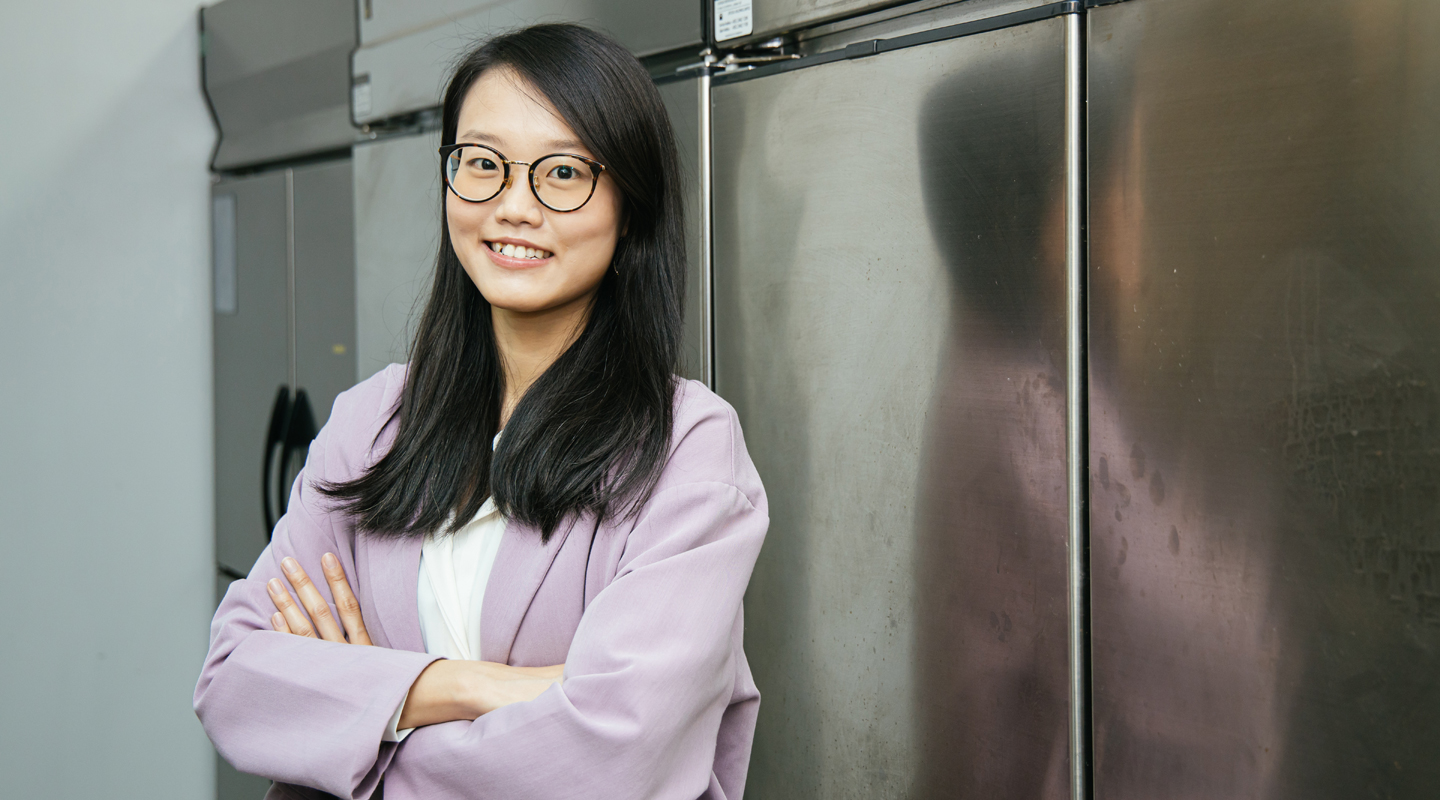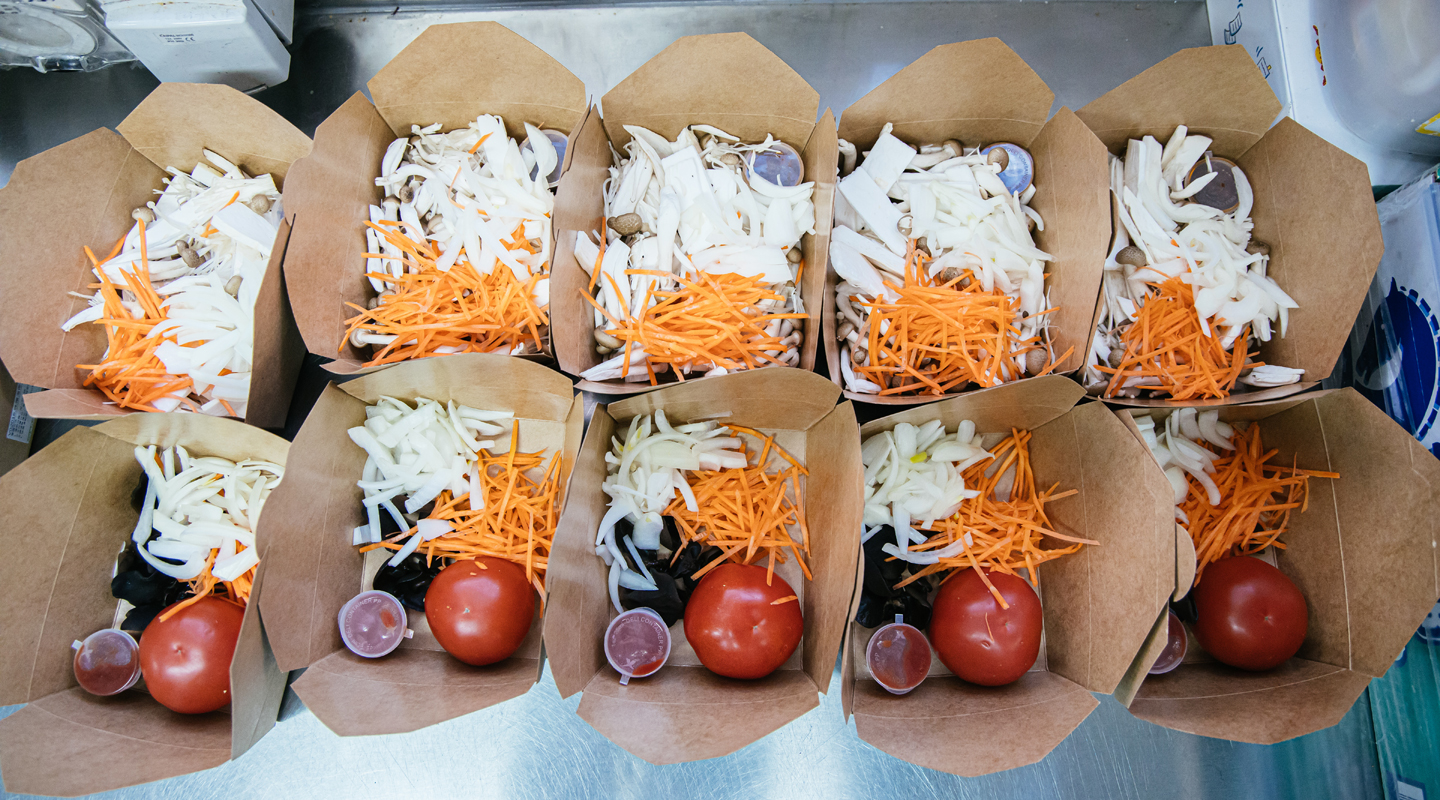Filling Stomachs and Empowering Women
Yip Hiu-wai dishes out appetizing social good

The old Tai Po Market is always crowded—more so on the eve of the Lunar New Year. My parents being out of town, the annual task of making the festive cakes fell to me. And so on a Thursday afternoon before the holidays, I found myself drifting in a stream of veteran home cooks in the market, pretending that I knew too where to look for what I was told is the best sugar for the sticky rice cake.
I had just rushed back from an interview in Tsuen Wan, and rarely had I ever had the leisure to explore the market though living just a few blocks away. There were choices aplenty, in units and prices that I had to scramble to convert on my phone. I was at a loss. Stupefied as the regulars around me deftly went on to make a dozen other purchases, I came to admire even more the work of my interviewee, Yip Hiu-wai, better known as Ding Ding.
A 2016 graduate of CUHK, Ding Ding is the founder of Festyle, a social enterprise offering meal kits to those lacking the time and knowledge to get their hands on quality ingredients like myself.
‘It could be eight or nine o’clock by the time dinner’s served if one is to work with raw, fresh food, having first had to travel back from work in another district and get hold of them,’ said Ding Ding, noting the long working hours endemic to Hong Kong. ‘Let’s not forget the point of going to work day in, day out is really to stay nourished.’
This is where Festyle comes in, providing the many overworked Hongkongers with the ingredients and recipes they need to prepare a proper, home-cooked meal for themselves and their family at the end of the day. As Ding Ding believes, good food is the groundwork for both physical and mental health. It brings people together and is a testimony of love.

But besides feeding busy families, these meal kits—designed and prepared by housewives wishing to put their culinary wisdom to use beyond the confines of their household—are also about helping women to break out of their gender role.
‘It might seem we’ve achieved gender equality in Hong Kong, but the fact is only one out of 10 company directors here is female, and women still make up the majority of homemakers,’ said Ding Ding. ‘Surely a woman is free to take up housework if that’s where she finds her calling, but no woman should be made to do that and give up on her aspirations.’
Such sacrifices are all too familiar to Ding Ding. Her mother used to be an English teacher, and she has always wanted to write. She still found the time to be a freelance writer at first after giving birth to Ding Ding and her two siblings, but then it got harder for her to keep writing while taking care of the family.
She is just one of the hundreds of thousands of housewives in Hong Kong hoping to broaden their horizon. As the city’s population ages and its workforce shrinks, Ding Ding believes it would revitalize the labour market to get them employed as well as helping them gain a foothold outside their home, and Festyle is her solution.
‘As a woman myself, I don’t want to have to give up on my dream either when I have my own family.’
Entrepreneurship has been Ding Ding’s passion ever since she was in secondary school, though she started out having a café in mind. It was with this vision that she chose sociology and management as her specializations, hoping they would equip her with critical-thinking skills and foundational knowledge of the commercial world.
‘As we moved on to senior years and kept being drilled to critique capitalism and all sorts of institutions, many of us in sociology became overwhelmed by a sense of futility,’ she recalled. ‘I wondered, though, if I could be part of the solution to all these problems instead of going with the flow when I graduate.’ By definition a commercial venture that works towards the greater good, a social enterprise was the solution she was looking for.
Being one of the first New Senior Secondary (NSS) students, Ding Ding had an extra year at university to explore her interests and prepare for a career as an entrepreneur. ‘Believe me when I say I was a good student,’ she said with a laugh. ‘I was the kind of person who reads every mass email and pays attention to the resources available to us.’ She took part in the human resources coaching sessions and joined the Center for Entrepreneurship’s Hong Kong Social Enterprise Challenge (HKSEC), and she remembered showing up at a talk on starting an SME, being the youngest person in the conference hall.
‘I asked people who had made it in the trade how I should begin. They told me to just do it.’

Perhaps they were really trying to be secretive, but no model or formula, indeed, could have predicted what was in store for Festyle. When what started to be the project of a team of five students first turned into a full-fledged enterprise, they ran into numerous unexpected problems. Having a limited fund, they resorted to using shared kitchens, which did not always work out. They were once forced to vacate the kitchen at such short notice they had to move all the equipment to Ding Ding’s home overnight, and one evening she went knocking on every restaurant’s door in Sham Shui Po on her own, hoping someone would share their kitchen with them. These frustrations pale, however, alongside what happened to one of their partners, also a CUHK student.
‘Just after he signed a contract with us and as the operation was about to go live, he killed himself on campus. There had been no signs whatsoever.’
To say they had a bitter start would be an understatement, but Ding Ding could be sure her family would have her back. When Festyle was in its infancy, her mother chipped in over a hundred recipes, compiled in the course of one night. Her father, a devotee of fine Chinese dining with backgrounds in the catering industry, has also been a great source of advice and inspiration.
Having picked themselves up, the Festyle team has now built up a database with 2,000 recipes and expanded into catering services. More importantly, they are moving closer to their goal of empowering women in Hong Kong.
‘There’s a housewife called Ah Hoi who joined Festyle after her daughter told her about us. It’s always nice to see how cheerful she’s become with her signature steamed pork patties being now enjoyed not just by her family but also by our many customers,’ said Ding Ding. In her sixties and going strong, Ah Hoi is now appearing in radio shows and documentaries with the team. Recently, she’s been invited to be an instructor, taking centre stage and becoming herself the kind of celebrity chefs she has seen on TV all her life.

Ding Ding is now planning on expanding her team and rolling out a ‘hometrepreneur’ programme, in which housewives can take advantage of Festyle’s platform and turn their works into microbusinesses. Just so more housewives can free up their time for training, she is also looking to collaborate with child caregivers in the community.
The young entrepreneur likes to call housewives ‘CEOs’ as opposed to ‘si naai’, the somewhat demeaning term for housewives in Cantonese, but she did not really think of herself as the CEO of her venture. At what was still a tiny start-up, the title did not carry much meaning. Five years on, the business has gotten on track, having had its fair share of twists and turns, and Ding Ding has made a solid CEO out of herself, shouldering greater responsibilities. Being an entrepreneur has its risks, but for as long as this is what she loves and believes in, there is no reason for her not to go on.
‘At times as dark as these, social enterprises can make a difference. That’s why we’ll keep doing our best, reaching out to more housewives and keeping people going with quality food,’ she said. ‘Business plays a key role in society. With a commercial sector working towards the greater good, I trust that the wider community will, too, find the right direction.’
By jasonyuen@cuhkcontents
Photos by Eric Sin
This article was originally published on CUHK Homepage in Mar 2021.

